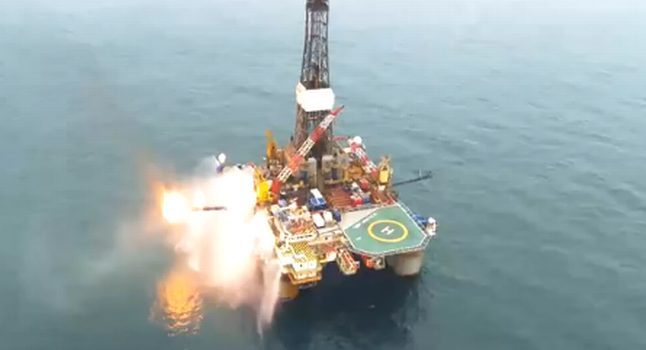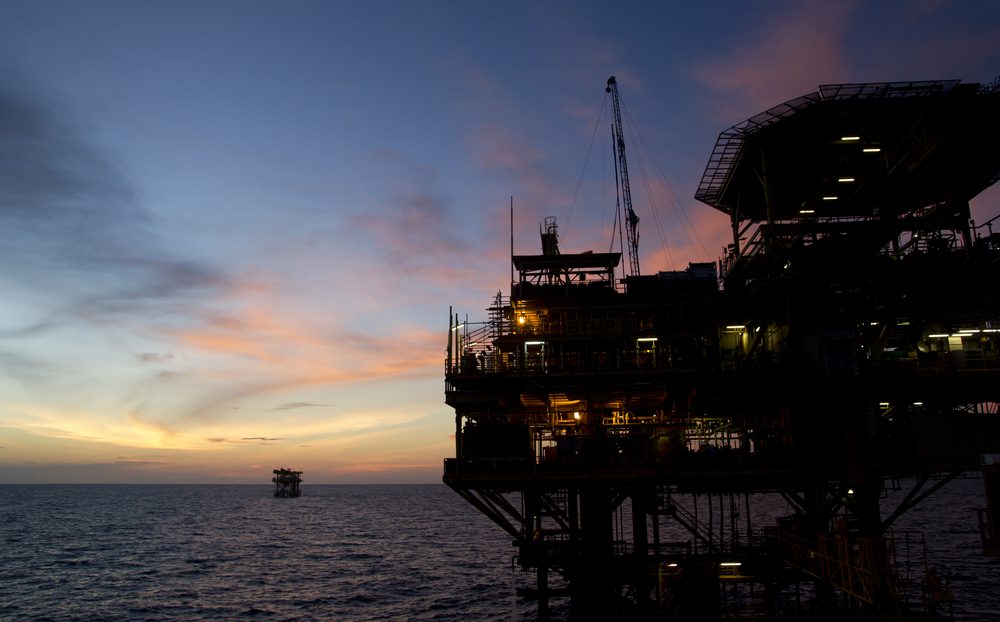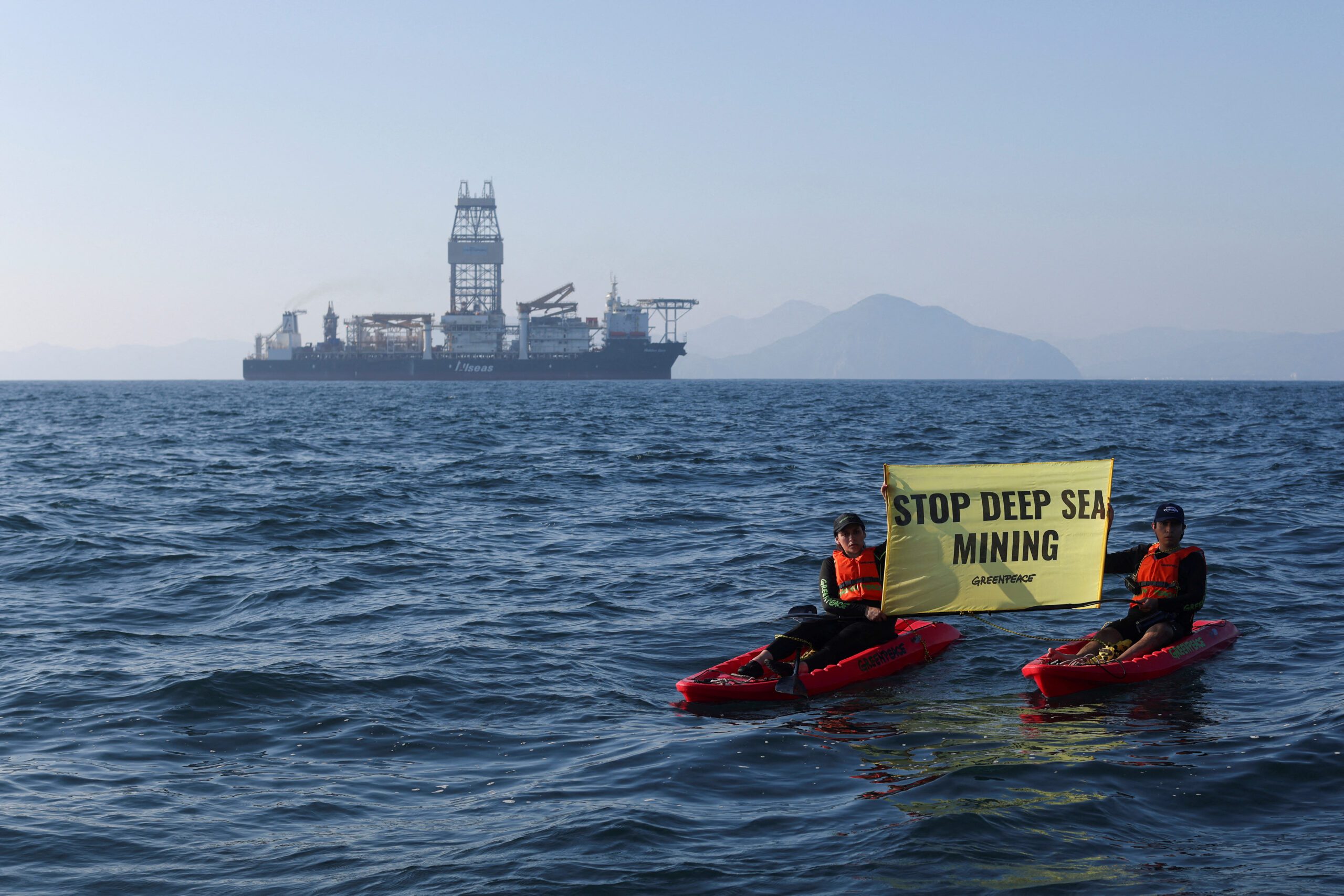Transocean’s GSF Arctic III conducts well test operations at Barryroe, image: Providence Resources
July 30 (Bloomberg) — Ireland finally found treasure at the end of the rainbow, or so it seemed in 2012.
After drilling in the North Celtic Sea Basin, about 40 miles off the Cork coast, Providence Resources Plc said its Barryroe oil field may hold as many as 1.6 billion barrels. The company’s shares surged, and the government hailed the first “significant” test of oil flows off Ireland for 12 years just as the nation’s debt-ravaged finances cried out for a boost.
Two years later, Providence still hasn’t found a partner to develop Barryroe, production has been delayed and the company’s share price has dropped 84 percent. For Ireland, it’s turned into another stalled attempt to emulate the North Sea discoveries that transformed economies and are underpinning Scotland’s bid for independence.
“Every couple of years we have the ‘black gold’ headlines, we are going to be the new North Sea,” Pat Shannon, geology professor at University College Dublin and chairman of the Irish Offshore Operators Association, an industry group, said in an interview. “Then it fades away.”
Since the exploration of Irish waters began in earnest, it’s been mostly futile. Esso, now part of Exxon Mobil Corp. first discovered oil at Barryroe after drilling in 1973 and 1974, before deeming it not commercial.
Rising Prices
Almost 40 years later, in 2012, Providence said results from its appraisal well in 100 meters of water had far exceeded expectations, and improved technology and rising prices changed the game in terms of extracting the oil.
With about 300 million barrels of oil recoverable, the field was big even by North Sea standards, Chief Executive Officer Tony O’Reilly said at the time, referring to “black gold” in a Bloomberg Television interview in March 2012.
“We put out results that were the results and we got them independently audited,” O’Reilly said in a telephone interview on July 24. “The market’s view of the story has changed, but the technical facts and figures are the same. There was no gilding the lily, no over-selling it.”
For Ireland, wholly dependent on imported oil, a few discoveries “could have a massive impact on our economy,” then Natural Resources Minister Fergus O’Dowd said in 2012. In an e- mailed response to questions yesterday, the Energy Ministry said it wouldn’t be appropriate to comment further, citing Providence’s April 15 statement that it’s in talks with potential partners.
Oil Fund
In Norway, the state’s oil fund amounts to about $890 billion, about four times the size of the Irish economy. A Providence-commissioned report suggested that Barryroe could generate 4.5 billion euros ($6 billion) in corporation tax alone for the Irish state over its lifetime, of about 30 years.
“People will always be cautious when there hasn’t been a past history of success,” said Shannon. “All the evidence points to significant oil in place, and it’s a matter of time before they meet the right partners.”
A year into the search, Providence hasn’t found a partner to share the cost of developing the field, the so-called farm- out process. O’Reilly initially put it at “several billion.”
Most oil and gas investment is now focused in the North American shale and in east Africa, Providence said. Some 52 potential deals are for sale around Ireland and the U.K. and more than half of these have been on the market for over a year, according to industry research company 1Derrick PTY Ltd.
Slow Market
“They’ve just been a victim of circumstance,” said Richard Hulf, who helps oversee about 19 billion pounds at Artemis Investment Management LLP in London, including Providence shares. “I don’t think there’s a lot that could have been done any better. It’s like sitting waiting for a plane that’s delayed.”
Son of the one-time billionaire businessman Anthony O’Reilly, a former Heinz & Co. CEO, Tony O’Reilly told analysts on a call on June 27 that he had expected the farm-out would be done by now. The company’s shares have dropped to 112 pence in London from 708 pence in September 2012, valuing Dublin-based Providence at 72 million pounds ($122 million) compared with a peak of 450 million pounds in 2012.
“We feel confident about being able to get a deal done,” Tony O’Reilly, 47, said last week. “The farm-out market right now is a very slow market. That’s just the environment we working in. When people sit and start talking about capital, there’s a lot more forensics. It just takes time.”
While the company has altered its plans to reduce its development costs from as much $1.9 billion, it will still cost $700 million to get oil out of eastern portion of the field, O’Reilly told analysts on June 27.
Bad Timing
With Providence drilling only one appraisal well so far, potential farm-out partners may want more evidence.
“There is a discovery there, the question is what is commercially recoverable,” said David Round, an analyst at BMO Capital Markets in London. “They may still find a partner, though the terms might not be as lucrative as they originally envisaged.”
Providence’s difficulties in finding a partner may have been amplified by past exploration failures in offshore Ireland. Some 158 wells have been drilled over past 45 years in Irish waters. Only four commercial gas fields have been found.
In April 2012, weeks after the announcement of the discovery, the company raised $100 million, selling shares to investors for 4.80 pounds each. O’Reilly used much of the proceeds along with asset sales to pay off company debts.
Investor Confidence
Providence had about 9 million euros of cash and cash equivalents at the end of 2013, compared with 16.8 million euros a year earlier. Last month, the company secured a $24 million standby facility to get through the farm-out process for a year, paying Melody Business Finance LLC a 10 percent interest rate.
“They tell us they’re confident of their doing so and hopefully they’re right,” said Giles Hargreave, chairman of Hargreave Hale Ltd. in London, which has about 4 billion pounds under management, including Providence shares. “In the meantime, it’s very disappointing.”
O’Reilly, paid a combined 1.2 million euros in the past two years, said the euphoria around the discovery and the economic backdrop at the time may have raised expectations too high. At the time, the economy was struggling to emerge from the worst recession on record, as massive bank losses helped drive Ireland into an international bailout.
“The amount of media coverage was truly astounding,” O’Reilly said. “We can’t script how people present things.”
(c) 2014 Bloomberg.

 Join The Club
Join The Club











